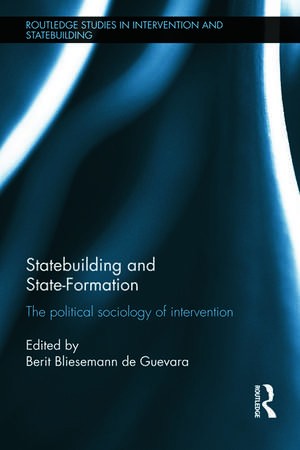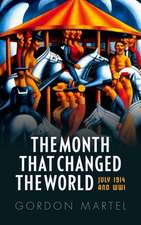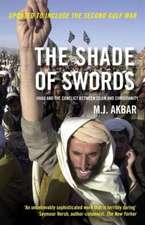Statebuilding and State-Formation: The Political Sociology of Intervention: Routledge Studies in Intervention and Statebuilding
Editat de Berit Bliesemann de Guevaraen Limba Engleză Hardback – 17 feb 2012
Using process-oriented approaches, the contributing authors explore what happens when conscious efforts at statebuilding ‘meet’ social contexts, and are transformed into daily routines. In order to explain their findings, they also analyse the temporally and spatially broader structures of world society which shape the possibilities of statebuilding.
Statebuilding and State-Formation includes a variety of case studies from post-conflict societies in Africa, Asia and Europe, as well as the headquarters and branch offices of international agencies. Drawing on various theoretical approaches from sociology and anthropology, the contributors discuss external interventions as well as self-led statebuilding projects. This edited volume is divided into three parts:
- Part I: State-Formation, Violence and Political Economy
- Part II: Governance, Legitimacy and Practice in Statebuilding and State-Formation
- Part III: The International Self – Statebuilders’ Institutional Logics, Social Backgrounds and Subjectivities
Din seria Routledge Studies in Intervention and Statebuilding
-
 Preț: 286.65 lei
Preț: 286.65 lei -
 Preț: 326.49 lei
Preț: 326.49 lei -
 Preț: 95.84 lei
Preț: 95.84 lei - 17%
 Preț: 271.02 lei
Preț: 271.02 lei - 18%
 Preț: 1003.43 lei
Preț: 1003.43 lei -
 Preț: 483.49 lei
Preț: 483.49 lei -
 Preț: 411.42 lei
Preț: 411.42 lei - 17%
 Preț: 269.39 lei
Preț: 269.39 lei - 18%
 Preț: 726.42 lei
Preț: 726.42 lei -
 Preț: 389.66 lei
Preț: 389.66 lei -
 Preț: 389.66 lei
Preț: 389.66 lei -
 Preț: 389.38 lei
Preț: 389.38 lei -
 Preț: 492.54 lei
Preț: 492.54 lei -
 Preț: 436.14 lei
Preț: 436.14 lei -
 Preț: 389.66 lei
Preț: 389.66 lei - 18%
 Preț: 1162.84 lei
Preț: 1162.84 lei - 26%
 Preț: 820.03 lei
Preț: 820.03 lei -
 Preț: 389.38 lei
Preț: 389.38 lei - 12%
 Preț: 340.36 lei
Preț: 340.36 lei - 26%
 Preț: 765.84 lei
Preț: 765.84 lei - 26%
 Preț: 762.57 lei
Preț: 762.57 lei - 26%
 Preț: 762.97 lei
Preț: 762.97 lei - 12%
 Preț: 299.52 lei
Preț: 299.52 lei - 18%
 Preț: 1118.12 lei
Preț: 1118.12 lei -
 Preț: 416.22 lei
Preț: 416.22 lei - 18%
 Preț: 1053.16 lei
Preț: 1053.16 lei - 12%
 Preț: 299.52 lei
Preț: 299.52 lei - 25%
 Preț: 852.53 lei
Preț: 852.53 lei -
 Preț: 210.70 lei
Preț: 210.70 lei - 18%
 Preț: 699.96 lei
Preț: 699.96 lei -
 Preț: 461.66 lei
Preț: 461.66 lei - 18%
 Preț: 895.08 lei
Preț: 895.08 lei - 18%
 Preț: 1167.36 lei
Preț: 1167.36 lei - 18%
 Preț: 1060.52 lei
Preț: 1060.52 lei -
 Preț: 409.73 lei
Preț: 409.73 lei
Preț: 851.99 lei
Preț vechi: 1142.95 lei
-25% Nou
Puncte Express: 1278
Preț estimativ în valută:
163.04€ • 169.19$ • 136.28£
163.04€ • 169.19$ • 136.28£
Carte tipărită la comandă
Livrare economică 15-29 martie
Preluare comenzi: 021 569.72.76
Specificații
ISBN-13: 9780415676977
ISBN-10: 0415676975
Pagini: 288
Ilustrații: 1 b/w image, 5 tables, 1 halftone and 2 line drawings
Dimensiuni: 156 x 234 x 21 mm
Greutate: 0.69 kg
Ediția:1
Editura: Taylor & Francis
Colecția Routledge
Seria Routledge Studies in Intervention and Statebuilding
Locul publicării:Oxford, United Kingdom
ISBN-10: 0415676975
Pagini: 288
Ilustrații: 1 b/w image, 5 tables, 1 halftone and 2 line drawings
Dimensiuni: 156 x 234 x 21 mm
Greutate: 0.69 kg
Ediția:1
Editura: Taylor & Francis
Colecția Routledge
Seria Routledge Studies in Intervention and Statebuilding
Locul publicării:Oxford, United Kingdom
Public țintă
Postgraduate, Professional, and UndergraduateCuprins
Introduction: Statebuilding and State-Formation Part I: State-Formation, Violence and Political Economy 1. Risk and Externalisation in Afghanistan – Why Statebuilding Upends State-Formation 2. International Intervention and the Congolese Army: A Paradox of Intermediary Rule 3. War Makers and State Makers: On State-Formative Networks and Illiberal Political Economy in Kosovo 4. Georgia-South Ossetia Networks of Profit: Challenges to Statebuilding Part II: Governance, Legitimacy and Practice in Statebuilding and State-Formation 5. Statebuilding versus State-Formation in East Timor 6. The Limitations of International Analyses of the State and Post-Conflict Statebuilding in Sierra Leone 7. Statebuilding as Tacit Trusteeship: The Case of Liberia 8. The Road Less Travelled: Self-Led Statebuilding and International ‘Non-Intervention’ in the Creation of Somaliland Part III: The International Self- Statebuilders' Institutional Logics, Social Backgrounds and Subjectivities 9. Three Arenas: The Conflictive Logic of External Statebuilding 10. The International Scramble for Police Reform in the Balkans 11. The ‘Statebuilding Habitus’: UN Staff and the Cultural Dimension of Liberal Intervention in Kosovo 12. The International Self and the Humanitarianisation of Politics: A Case Study of Goma, DR Congo 13. The State We Are(n’t) In: Liminal Subjectivity in Aid Worker Auto-Biographies Conclusions: Neither Built nor Formed – the Transformation of States under International Intervention
Notă biografică
Berit Bliesemann de Guevara is a researcher and lecturer in international relations at Helmut Schmidt University Hamburg. She co-authored Illusion Statebuilding (Hamburg 2010) and is assistant editor of the Journal of Intervention and Statebuilding.
Descriere
This book examines the ways in which long-term processes of state-formation limit the possibilities for short-term political projects of statebuilding.














